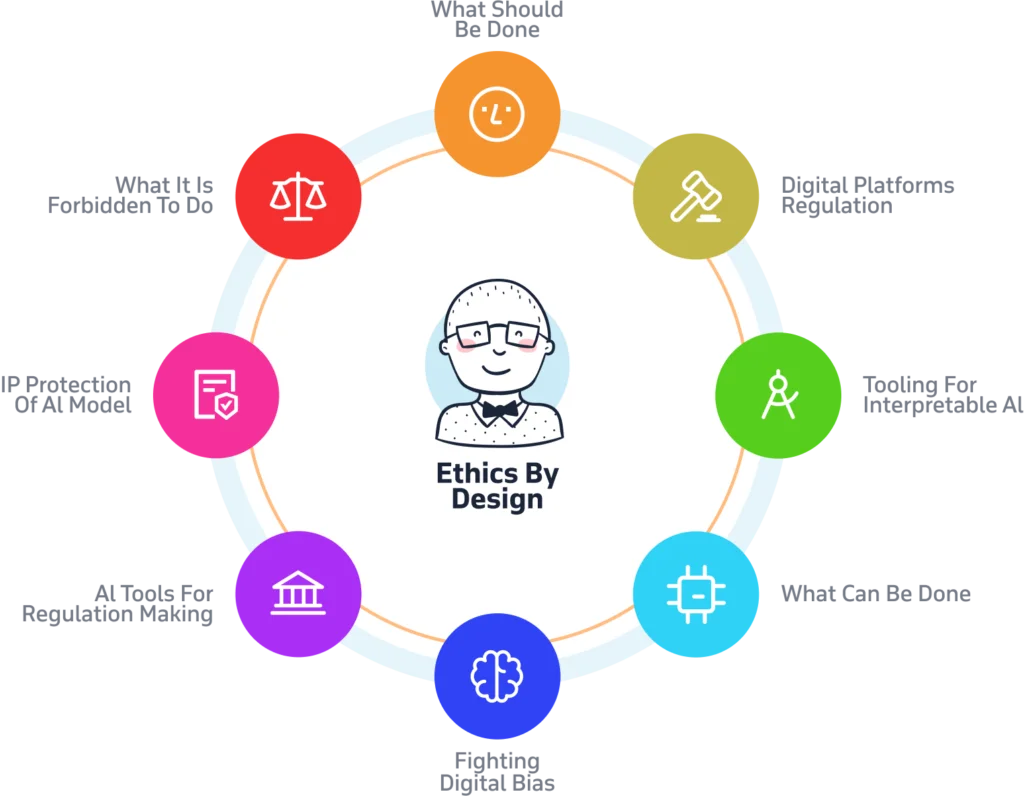Introduction to Ethics in the AI Space
Author: Ammar Malik
The ethical implications of artificial intelligence (AI) have become a central concern in our rapidly advancing technological landscape. As AI systems play an increasingly prominent role in various aspects of society from healthcare to finance and beyond, questions surrounding their ethical use, impact on privacy, and potential biases have come to the forefront. Striking the right balance between technological innovation and ethical considerations is crucial to ensure that AI benefits humanity, without compromising fundamental values and principles. In this complex and evolving landscape, exploring the ethical dimensions of AI is essential for fostering responsible development and deployment of these powerful technologies.
History of Ethics in AI
It is important to consider the history of Artificial Intelligence before being able to discuss its ethical use cases. The inception of AI can be traced back to a Dartmouth conference in 1956 where many key figures in the Computer Science space discussed the potential of creating intelligent machines which would be able to solve a multitude of problems not just the ones they were programmed to. Despite many researchers spending years trying to move the idea forward there was no discussion on the ethics of such technology. The primary focus was to push towards reaching technical milestones and pushing the boundaries of computing. It was not that these researchers did not care but rather their main focus was to showcase how this kind of technology can improve our lives. Moreover, there wasn’t much interest from ethicists, policymakers, and even the general public who did not know that this sort of computing could exist. As such this serves as an important lesson for new technological innovations to focus on their ethical consequences on society.
Ethics of AI in Media
After a certain time, the entertainment industry became fascinated with AI, creating many pieces of media related to how AI can affect society. As such this was a good opportunity for the public to see how AI can work, and how it can have negative consequences as well as positive changes to people’s lifestyles. This leads us to Isaac Asimov who was a science fiction writer but did contribute to the discussion of ethical AI. He introduced the 3 laws of robotics in his works which detailed how ethics shaped the behavior of such machines to ensure their interaction with humans was governed. Due to this, he had quite the influence on AI ethics as it laid the groundwork for the foundation of ethical guidelines in the AI space, considering the safety of humans above all.
Researchers in AI Ethics
A key figure in the space of AI was Timnit Gebru, a computer scientist and AI researcher known for her work adding to the ethical considerations of AI. Her work has been related to raising awareness about this issue, she has done research into aspects like bias and fairness, ethical considerations in large language models, and diversity and inclusion in AI. It was not without controversy, however; she was fired abruptly from her position as co-leader of Google’s ethical AI team due to a paper she published related to the environmental impact and risks of running LLMs. As such it highlighted the importance of corporate responsibility in terms of the treatment of AI researchers in doing their most ethical work.

Ethics in AI Today
Now as we talk about AI in the 21st century, many laws have passed regarding the use of AI. The IEEE Global Initiative on Ethics of Autonomous and Intelligent Systems plays a pivotal role in establishing industry standards and guidelines for developing AI models. They introduced an initiative called the ethically aligned design which serves as a framework to help better guide the producers of AI to ensure better transparency, accountability, and societal impact. They also have working groups that focus on specific areas of AI ethics and work to help educate the public regarding the ethical implications of AI. It is important to educate the public about how to identify AI-generated images and videos to reduce the amount of misinformation that is being spread about world events. Further discussion is needed as well in terms of how fair the data it is being trained on, who benefits from AI, who deploys AI technology and what their intentions are, etc.

Conclusion
We have examined the development of AI from a historical perspective, including its hopeful beginnings to the current issues, as we have investigated the ethics of AI. Notably, Isaac Asimov’s Three Laws of Robotics and Timnit Gebru’s profound contributions have affected the ethical conversation in AI research. Public attitudes have been reflected and impacted by the entertainment industry’s portrayal of AI, highlighting the necessity of ethical considerations in both fictional and real-world AI applications. The analysis of industry guidelines and standards, such as the IEEE’s Ethically Aligned Design and tech companies’ ethical principles, highlights the coordinated efforts to create responsible AI practices. The ethical environment of artificial intelligence is always changing as technology progresses. There is a growing demand for ethical frameworks as AI systems are incorporated into everyday life.
Interdisciplinary cooperation is becoming more prevalent in the sector, with the public, technologists, ethicists, and legislators all participating in the conversation. Addressing issues like prejudice, privacy problems, and the moral ramifications of potent AI systems are all part of continuous progress. As ethical issues grow more and more important in the development of AI, the emphasis shifts from technical achievements to societal effects. To ensure that AI technologies serve humanity responsibly and ethically, openness, accountability, and inclusivity are critical components of the future of AI ethics. The pursuit of ethical AI is an ongoing process that calls for alertness, flexibility, and a cooperative framework to help ensure that the goal of true ethics is followed.




